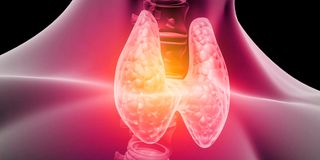Hyperthyroidism: When your organs work on fast-forward

Human thyroid anatomy
What you need to know:
- The stomach lining is usually protected by a thick layer of mucus.
- For an ulcer to develop, the protective layer has usually been eroded and allowing stomach acid and digestive juices to damage the lining, forming a sore.
Dear Doc,
What is hyperthyroidism? Also, what are its adverse effects?
Dear reader,
Hyperthyroidism refers to a condition where the body makes too much thyroid hormone. It is also known as overactive thyroid. The thyroid gland is a small gland located on the front part of the neck, and it produces thyroid hormone. The thyroid hormone controls body mechanism, which is the process through which the body processes food into energy that is available for all tissues and organs to use for daily function. When there is too much thyroid hormone, then many body functions speed up.
The thyroid may be overactive as a result of genetic disorders, auto-immune disease (where the immune system attacks the body’s own tissues), inflammatory disorders, thyroid nodules, pituitary adenoma, excessive iodine consumption, and some medications. Pregnancy may also lead to disruptions in thyroid function. Rarely, the overactive thyroid may be as a result of thyroid cancer.
Symptoms of hyperthyroidism include weight loss, increased hunger, palpitations (awareness of the heartbeat), fast and/or irregular heartbeat, high blood pressure, tremors, excessive sweating, heat sensitivity, thin, warm and moist skin, and brittle hair, nervousness, being irritable, fatigue, weakness, sleep changes, changes to the menstrual cycle, and changes in bowel movements. There may also be eye-related symptoms like swelling around the eyes, double vision, and bulging of the eyes. There may also be an enlarged thyroid gland, which is seen as a swelling on the front of the neck.
Hyperthyroidism is diagnosed through blood tests to check the levels of the thyroid hormone. Other tests may be done depending on the suspected underlying cause e.g. thyroid scan, autoantibody tests, and scintigraphy, among others.
In management of hyperthyroidism, there is symptomatic management to address some of the symptoms. Controlling the levels of thyroid hormones may be in the form of anti-thyroid medications, radioactive iodine or through thyroid surgery where there is partial or complete removal of the thyroid gland.
What are peptic ulcers? What precautions should one take to avoid such?
Yours faithfully,
Alnashir D Walji
Dear Alnashir,
An ulcer is an open wound or sore resulting from lack of healing of a break on the surface of the skin or of a mucous membrane. A stomach ulcer is a break in the lining of the stomach, oesophagus or the duodenum. An ulcer in the stomach is called a stomach or gastric ulcer. An ulcer in the oesophagus or food pipe is called an oesophageal ulcer, while an ulcer in the duodenum (the first part of the small intestines) is called a duodenal ulcer. The stomach lining is usually protected by a thick layer of mucus. For an ulcer to develop, the protective layer has usually been eroded and allowing stomach acid and digestive juices to damage the lining, forming a sore.
An ulcer can develop as a result of infection with Helicobacter pylori bacteria or if there is prolonged use of non-steroidal anti-inflammatory drugs (Nsaids) like aspirin and brufen, or other medications like steroids, anticoagulants, and some anti-depressants. Other risk factors for developing an ulcer include a family history of ulcer, liver disease, kidney disease, serious illness, surgery, chronic stress, regular alcohol consumption and smoking. While spicy foods may not cause an ulcer, they can make the symptoms worse.
The symptoms of having a peptic ulcer include upper abdominal pain, nausea, vomiting, bloating, belching, or heartburn. Complications include bleeding ulcer, which may be seen as vomiting blood or black sticky stools; severe pain, and severe vomiting. If there is a lot of bleeding, if there’s obstruction due to scarring, or if the ulcer perforates, this is a medical emergency that can lead to death if not attended to.
Diagnosis of an ulcer would include medical examination, H. pylori stool test, endoscopy, and/or other related tests. There may also be tests related to any underlying concerns.
Treatment includes medication to eradicate the H. pylori bacteria if present, medication to control the amount of acid being produced, medication to neutralise the acid, and/or medication to protect the stomach lining. In case of bleeding, invasive procedures are utilised to stop the bleeding, and surgery is needed to manage perforation and obstruction.
Prevention of ulcers includes limiting use of Nsaids and other medications that can cause ulcers, including use of safer alternatives; treatment of H. pylori infection and any other underlying infections; and avoiding smoking and alcohol consumption.
Dear Flo,
I usually feel lower abdominal pain during the time when I am ovulating. The pain is sometimes very bad and I need to take painkillers. What could this be? Should I be worried?
Jen
Dear Jen,
You are most likely experiencing mittelschmerz. This is pain that occurs in the middle of the monthly cycle during ovulation, when the ovum is released from its follicle to start moving along the fallopian tubes. The pain may be accompanied by nausea, mild vaginal discharge or mild vaginal bleeding.
The pain is usually on one side of the lower abdomen, the side where the ovum is being released from, and the pain lasts for several hours or a day or two.
To manage it at home, you can take a warm bath, or use a hot water bottle or painkillers. However, when the pain is severe, it is advisable to see a gynaecologist for examination and tests, including a pelvic ultrasound scan. This is to evaluate for any other concerns like pelvic infection, endometriosis, an ovarian cyst etc. If an underlying problem is found, then it will be addressed. For severe pain, hormonal medication can be used to control or prevent the symptoms.
Send your questions to healthynation@ke.nationmedia.com

